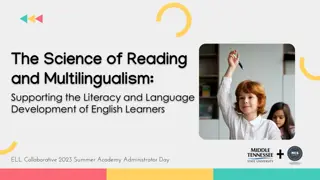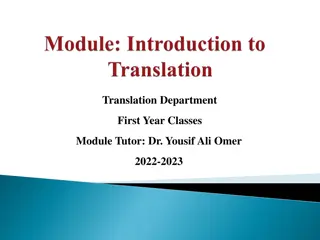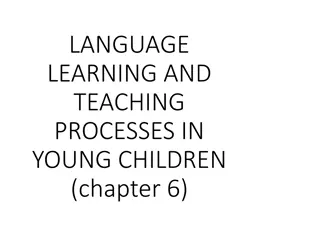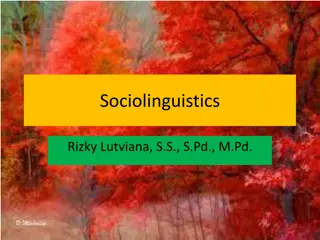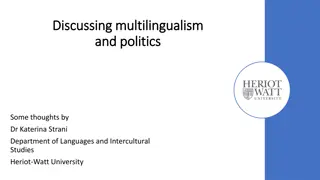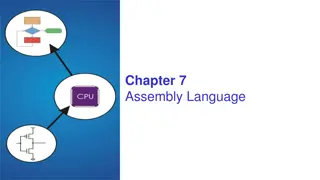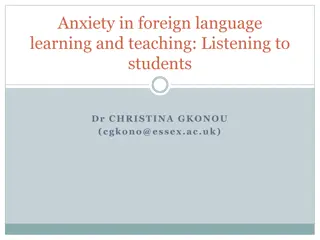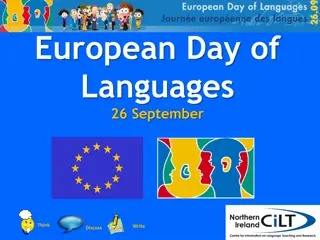Multilingualism and Language Development
At Total Communication, we believe in empowering every child's communication journeyu2014especially in multilingual environments. Scientific research consistently shows that multilingualism does not cause language delays. In fact, children exposed t
Download Presentation

Please find below an Image/Link to download the presentation.
The content on the website is provided AS IS for your information and personal use only. It may not be sold, licensed, or shared on other websites without obtaining consent from the author.If you encounter any issues during the download, it is possible that the publisher has removed the file from their server.
You are allowed to download the files provided on this website for personal or commercial use, subject to the condition that they are used lawfully. All files are the property of their respective owners.
The content on the website is provided AS IS for your information and personal use only. It may not be sold, licensed, or shared on other websites without obtaining consent from the author.
E N D
Presentation Transcript
Multilingualism and Language Development: What the Science Really Says Many parents worry that exposing a child to more than one language will confuse them or delay their speech. It's a common concern and an unnecessary one. Decades of research in linguistics, psychology, and education tell us that multilingualism does not cause language delays. In fact, it can strengthen how children learn, think, and communicate.
Myth Fact Children can learn multiple languages at once without confusion. Their brains are designed to handle it. Children get confused when exposed to more than one language. Code-switching is a normal part of multilingual development. It shows flexibility and resourcefulness. Mixing languages (code-switching) means the child is struggling. Language communication difficulties, not multilingual exposure. delays are caused by underlying Speaking more than one language causes speech delays. Early exposure to multiple languages builds stronger foundations in each especially when the input is rich and t s better to focus on one language first. meaningful. Children benefit most when parents speak in the language they are most fluent in. Dropping the home language can limit language development, not improve it. Parents should stop speaking their home language to help the child improve in English.
Multilingualism does not cause Language Delay Children growing up in multilingual homes often develop language differently, but differently does not mean delayed. If a child shows a language delay, it is usually linked to an underlying communication difficulty, not the number of languages spoken at home For example, a child with a speech delay will likely show similar challenges whether exposed to one language or three. The issue is not the multilingual exposure; it s the child s individual language profile. Early Language Exposure Supports Learning The earlier a child is exposed to multiple languages, the more naturally their brain can organise those languages. Young children have more neuroplasticity. Their brains are wired to take in sound patterns, grammar structures, and vocabulary across different systems at the same time. Early exposure makes it easier to build strong foundations in each language, especially when there's consistent input across daily routines. Code-switching is normal Children often switch between languages mid-sentence. This is called code-switching. It s not a sign of confusion; it s a sign that the child is using the words and structures they know best to express themselves clearly. Think of it like this: if a child knows the word apple in English but not in their home language, they ll use the one they know. This is resourcefulness, not confusion. The Cognitive Benefits of Multilingualism Children who grow up with more than one language tend to show stronger skills in areas like: Attention control
Task switching Problem-solving Understanding how language works (metalinguistic awareness) These skills play an important role in later academic tasks like reading, writing, and comprehension. What Parents Can Do Speak your home language freely. Children thrive when they have rich language input. Don t drop a language for fear of confusion. This can reduce a child s exposure to meaningful vocabulary and ideas. Read books in all the languages spoken at home. Build vocabulary and connections at the same time. Talk to your child in the language you are most comfortable in. Emotional connection supports learning. What Teachers Can Look Out For Compare across languages. A child who struggles in all languages may need a referral. A child who is strong in one language but not another may just need more input. Focus on communication, not just vocabulary. Can the child express ideas, ask questions, and understand instructions? Speak with parents about home language use. This helps clarify whether a child s development is truly delayed or simply different. Refer early if there are concerns across all languages. Early support makes a difference. What does this mean for you and your child
Multilingualism is not a barrier. Its a strength. If a child is learning more than one language and seems to be developing slowly, it s worth looking deeper but not blaming the languages. Speech and language therapists can help clarify whether support is needed. The goal is always the same: clear, confident communication across any language a child calls their own. Connect with us to book a consultation: Contact Total Communication Therapy Center Call/WhatsApp: +65 9115 8895 Important Links: Bilingual Therapy Language Delay Tags: speech and language therapy Singapore Language Delay Language Delay Intervention multilingual therapy Speech and Language Therapy


